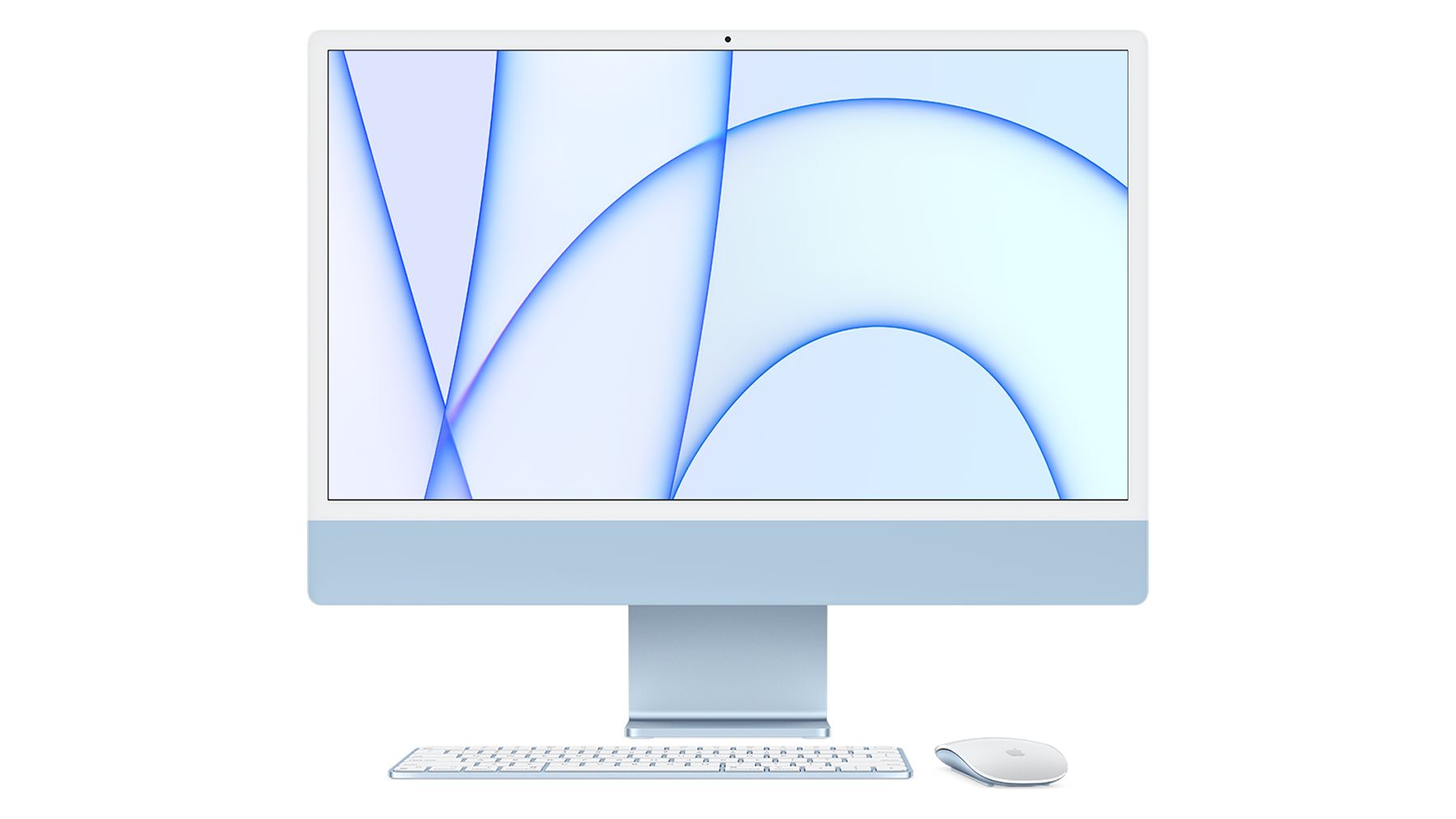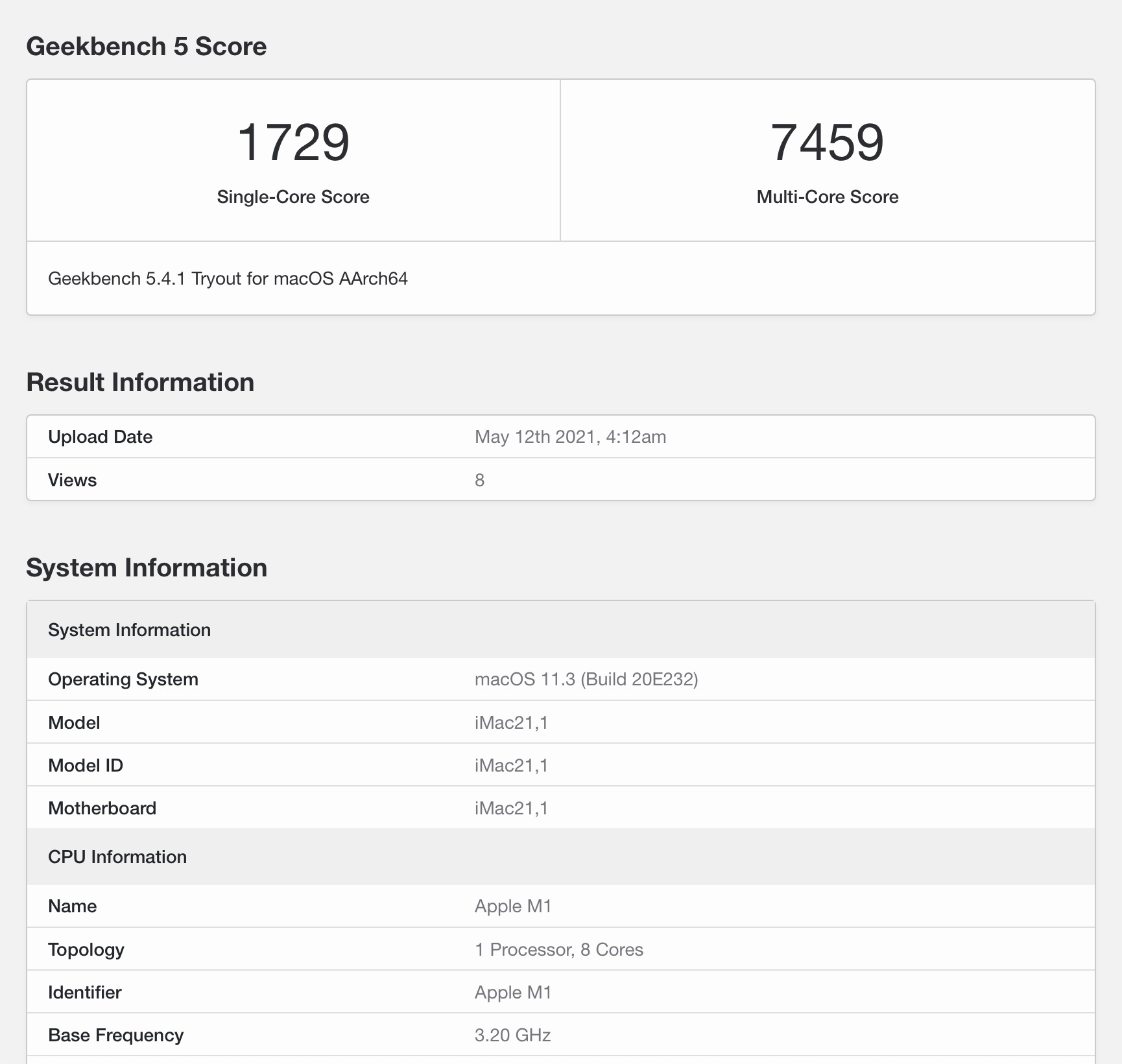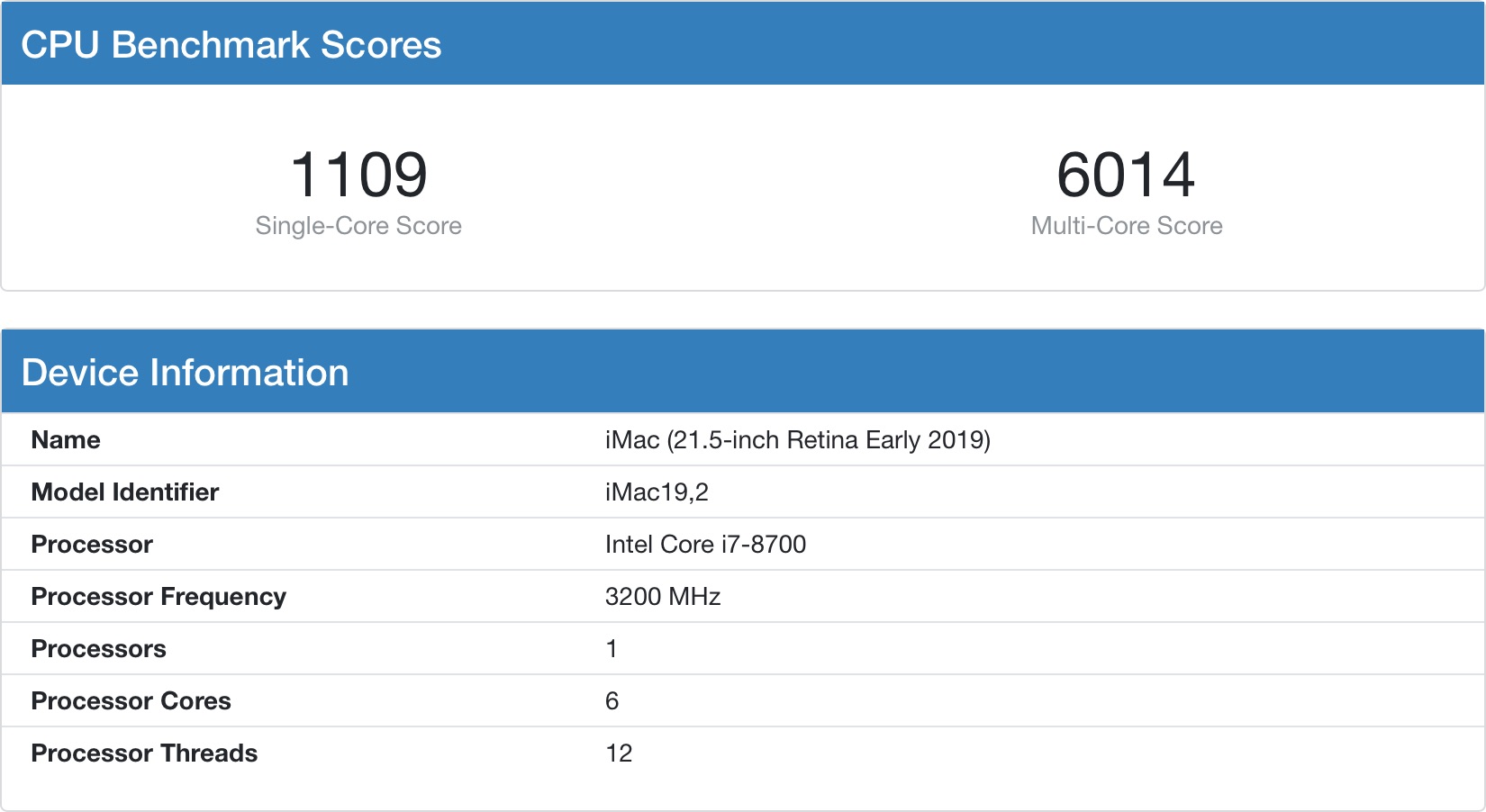Not ARM, Apple.Let’s not bash Intel. They did a good job powering the Mac for many years. Quantum leaps like this happen every so often in computing. ARM have done a fantastic job.
Got a tip for us?
Let us know
Become a MacRumors Supporter for $50/year with no ads, ability to filter front page stories, and private forums.
M1 iMac is Up to 56% Faster Than Prior-Generation High-End 21.5-Inch iMac
- Thread starter MacRumors
- Start date
- Sort by reaction score
You are using an out of date browser. It may not display this or other websites correctly.
You should upgrade or use an alternative browser.
You should upgrade or use an alternative browser.
You are not serious, are you? What do you expect Apple to do? Since when is a 6 month old chip, old? How often does Intel update its CPUs? I expect Apple to offer minor updates every year and significant upgrades every other year. CPU development is not something that happens in a day. It takes a lot of time to design, develop and test new CPUs and motherboard components.Exactly. M1 was great when it was released a few months ago in Nov, but it is just pathetic by now. I expect Apple Silicon to improve by leaps and bounds every few months, not for them to reuse a 6-month old M1 chip. These 24" iMac should be on M2 with significantly improved GHz performance AND more cores at the same time, not to mention the usual tighter integration and multi-threading performance.
I never minded the chin before, and I don't now, but the missing apple logo means all my attention is just staring at that big aluminum panel. Without it supporting some other visual element, such as speaker perforations or a logo, it becomes its own visual element, & it's not apparent why the design team thought it should be. Strange.
Here fixed it.
Than who will manufacture these Apple Silicon chips? TMSC doesn't have enough capacity...Intel should go into liquidation
Intel CEO Expands on Desire to Make Apple Silicon Chips, Touts 'Competitive Fun' With Apple

Intel CEO Expands on Desire to Make Apple Silicon Chips, Touts 'Competitive Fun' With Apple
In an interview with Yahoo Finance today, Intel's newly appointed CEO Pat Gelsinger said that the ongoing competition between his company and...
All this makes me wonder....
I enjoy gaming but refuse to use a Windows machine, the excuse that developers gave previously was that the Mac was underpowered...so what now? I can see more and more people switching to Apple, I sure hope the developers come around.
I enjoy gaming but refuse to use a Windows machine, the excuse that developers gave previously was that the Mac was underpowered...so what now? I can see more and more people switching to Apple, I sure hope the developers come around.
Makes sense for me that iMac use the same M1.
- Cheaper : makes 1 quadrillion of M1 is cheaper than makes some M1x for iMac.
- Easier to communicate : 3 levels of products.
1-“regular”: mini, air, iMac 24.
2-“more powerful” : iMac 28/32, mbp 16 (and mbp 14 should be there too).
3- top : Mac Pro.
- More logical : there is no reason why the smaller iMac should be more powerful than a Mac mini. I just bought a mini because I wanted to use my 38" ultra wide screen, not because I wanted a less powerful computer.
- Cheaper : makes 1 quadrillion of M1 is cheaper than makes some M1x for iMac.
- Easier to communicate : 3 levels of products.
1-“regular”: mini, air, iMac 24.
2-“more powerful” : iMac 28/32, mbp 16 (and mbp 14 should be there too).
3- top : Mac Pro.
- More logical : there is no reason why the smaller iMac should be more powerful than a Mac mini. I just bought a mini because I wanted to use my 38" ultra wide screen, not because I wanted a less powerful computer.
Your expectations are too low.You are not serious, are you? What do you expect Apple to do? Since when is a 6 month old chip, old? How often does Intel update its CPUs? I expect Apple to offer minor updates every year and significant upgrades every other year. CPU development is not something that happens in a day. It takes a lot of time to design, develop and test new CPUs and motherboard components.
I expect Apple to offer significant upgrades EVERY year, like it did for A series chips every year for the past 10 years. Thinking back, Apple did actually keep delivering significant A series chips upgrade: A4 was the start, A5 and A6 were much faster duo cores, A7 was 64-bit, A9 was very fast and laid the groundwork for modern iOS speed, A11 and above put an emphasis on machine learning. And the speed increases were great year after year. Apple should do the same for Mac chips.
The point isnt to compare with Intel, otherwise you might as well just stick with Intel chips. It's normal for Apple to blow way past Intel, so there shouldnt even be a comparison with crappy Intel chips to begin with.
This is an irrelevant argument. All the sites do this type of comparison, from phones to tablets to laptops and desktops. Isn’t there a M1 iPad Pro vs A-whatever prior gen iPad Pro comparo floating around.The i7 chips are not top end. I’m comparing against current i7, the chip that would have been in the 21” top end model had Apple kept up with refreshes. What’s not fair is comparing the M1 against a chip from 2017.
For the purposes of benchmarking them against comparable current processors, your argument is valid…but this is another lens through which to view performance. Weren’t these older 8th gen Intel chips still available in lower level MacBooks in the very recent past? One has to speculate that Intel’s ongoing difficulty in getting their newer processors to market is a big part of the reason why Apple is going it on their own.
Yes i7 AND i9 are top end. i5 is middle and i3 is low end. Compare this to an i3 or i5 NOT an i7. I have a 10th gen i7 on my work/gaming desktop and it suits all the professional needs I have.The i7 chips are not top end. I’m comparing against current i7, the chip that would have been in the 21” top end model had Apple kept up with refreshes. What’s not fair is comparing the M1 against a chip from 2017.
What the iMac M1 is replacing is i3 and i5 with maxed out being i7.
You no longer need to make compromises. You get the form factor you want and get the same performance.Apple seems to be following a very compact chip structure, with very little variance from M1 iPad to 24" iMac, it doesn't mean a thing about lack of progress, they don't seem to play the frequency/ghz game, the next step is not a higher-frequency M1 but an M2, M2X, etc...
Intel will catch up. Hopefully manufacturing in the US and paying taxes.
Apple's M1 iMacs are set to start delivering to customers next week, and ahead of the official launch day, benchmarks for the machines have been showing up on Geekbench, likely from reviewers who are testing them.

It will come as no surprise that M1 iMac benchmarks are right on par with benchmarks for the M1 MacBook Pro, MacBook Air, and Mac mini, coming in with an average single-core score of 1724 and an average multi-core score of 7453, aggregated from three benchmarks that are currently available.
Benchmarks are for the iMac21,1, which is likely the entry-level option with an 8-core CPU, a 7-core GPU, and two Thunderbolt ports. The M1 iMac benchmarks list 8 CPU cores and a base frequency of 3.2GHz, and they're running macOS 11.3.

M1 iMac
The 24-inch M1 iMac significantly outperforms the 2019 21.5-inch iMac with an Intel chip that it's replacing, and it's going to be a solid upgrade over all older 21.5-inch machines.
The previous-generation high-end 21.5-inch iMac earned a single-core score of 1109 and a multi-core score of 6014, so the M1 iMac is 56 percent faster when it comes to single-core performance and 24 percent faster when it comes to multi-core performance.

2019 high-end 21.5-inch Intel iMac
Compared to the current high-end 27-inch iMac, the M1 Mac outperforms in single-core performance, but it is lagging behind the 10th-generation Comet Lake Intel chip in multi-core performance. The high-end 27-inch iMac earned a single-core score of 1247 and a multi-core score of 9002.
The M1 iMac's single-core performance is 38 percent faster, but the Intel iMac's multi-core performance is 25 percent faster.
With these scores, the M1 iMac is not going to be able to replace the high-end 27-inch iMac because it lags behind in multi-core performance, but Apple is working on higher-end Apple silicon chips for desktop machines and we'll likely see an even more powerful Apple-designed chip introduced when Apple is ready to replace the 27-inch iMac with a new model.
The M1 iMac does outperform lower-end 27-inch iMac models with Intel chips, beating the 6-core Intel models in both single and multi-core performance.
Pricing on the M1 iMacs starts at $1,299 for the entry-level model and $1,499 for the version with an 8-core GPU, two additional USB-C ports, Gigabit Ethernet, and additional color options. M1 iMac models ordered today will ship out in June, but those who preordered will soon be receiving their machines, and we'll learn more about them when reviews go live.
Article Link: M1 iMac is Up to 56% Faster Than Prior-Generation High-End 21.5-Inch iMac
Apple is doing the right thing here. You are no longer punished for wanting the form factor you want. Want a fanless computer? Hey it still has an M1. Want a computer but already have a screen, keyboard and mouse? Good news the Mac mini has the M1. Want an all in one? Also has an M1. You get to choose the form factor you want and not get compromised by low powered i3 or an overly hot HOT HOT Mac Mini on an i7.The M1 chip seems to be great for what it is, but Apple really needs to demonstrate that they have more than one chip in their repertoire. As it is, Apple is starting to simply make copies of the same computer in different-looking cases. The MBA, 13" MBP, Mac Mini, iPad Pro, and now M1 iMac are almost identical apart from their form factor.
A real chip manufacturer has multiple products that explore the price/clock speed/cores/feature set/power consumption landscape and can be matched to use case. The M1 kills it for an ultrabook, but is only okay for a business desktop and fails for anything that needs significant graphical power.
I was really hoping that the new iMac would have started expanding the landscape that Apple covers, but no such luck. Because of this, I see no reason to get one over a Mac Mini, because it literally offers nothing else of value -- same performance, same IO, same memory and SSD limitations. At least with a Mac Mini you're not required to throw away a pricey monitor when you want to upgrade the computer, which will become obsolete much more quickly than the monitor will.
The pessimistic side of me says that this one-size-fits-all approach is typical for the Apple of the last decade. But I still want to hope that the higher end MBPs and iMacs will start to change this.
Geekbench score comparisions between Apple and Intel chips are pointless. Does anyone truly believe that the M1 is 37% faster than the fastest Intel Mac, which is what Geekbench suggests?
The M1 has impressive figures, but real performance is underwhelming.
The M1 has impressive figures, but real performance is underwhelming.
Also, lets be honest here. I am sure COVID slowed down the transition SOME. I mean I have been checking every....single.....day for an RTX 3070, 3080 and 3090 since it launched last year and still have not found one in stock. There is a chip shortage going on that is even impacting automobiles. So lets just hold off on bashing Apple for still using the M1 6 months in please."And after over 8 months, selling exactly the same chip, at the same speed, in just a few more models, is kind of unprecedented."
Over 8 months? Let's see... I ordered my M1 MBA on launch day and received it on Dec 3rd, 2020. M1 iMacs are in the process of being delivered right now. That's a little over six months. Why the need to exaggerate? Yes, you probably are older than me.
Tim Cook said the transition would take two years. Allegedly M2 CPUs are in the process of being fabbed at TSMC, which I expect will take 2-3 months. You may not be aware the M1 is Apple's first soc CPU. No doubt in my mind there will be large screen iMacs using the M2 delivered later this year and will offer a substantial increase in performance over the entry level M1 iMac.
If you don't find that amazing, you can always contact Johny Srouji at Apple and give him a piece of your mind.
It is about that much faster than my 2019 i9 iMac - which is why I sold my $4,500 iMac for a $1,200 Mac mini.Geekbench score comparisions between Apple and Intel chips are pointless. Does anyone truly believe that the M1 is 37% faster than the fastest Intel Mac, which is what Geekbench suggests?
The M1 has impressive figures, but real performance is underwhelming.
COVID and a chip shortage people.....This likely impacted the M2 or general progression SOME.Exactly. M1 was great when it was released a few months ago in Nov, but it is just pathetic by now. I expect Apple Silicon to improve by leaps and bounds every few months, not for them to reuse a 6-month old M1 chip. These 24" iMac should be on M2 with significantly improved GHz performance AND more cores at the same time, not to mention the usual tighter integration and multi-threading performance.
Game developers will not spend money on AAA games on a SOC ASIC processor. I use boot camp and Windows 10 on a MacBook Pro 16 and a EGPU with a 3080 card, because there is software for it now.All this makes me wonder....
I enjoy gaming but refuse to use a Windows machine, the excuse that developers gave previously was that the Mac was underpowered...so what now? I can see more and more people switching to Apple, I sure hope the developers come around.
I got a Xbox series X at launch, For when support is no longer viable on a Mac with boot camp and windows 10. The Xbox and PS5 are so powerful now game developers don’t need to do anything with a ASIC processor, development cost are to high to support.
Apple games will be relegated to simple IOS games from now on.
Chip design is by its very nature expensive. It makes sense that Apple would try to recoup their investment by using the M1 chip on as many of its products as possible (5 to date). It also makes app development easier because more devices are essentially running the same specs, further standardising the platform.Exactly. M1 was great when it was released a few months ago in Nov, but it is just pathetic by now. I expect Apple Silicon to improve by leaps and bounds every few months, not for them to reuse a 6-month old M1 chip. These 24" iMac should be on M2 with significantly improved GHz performance AND more cores at the same time, not to mention the usual tighter integration and multi-threading performance.
Apple is not going to keep releasing so many iterations of the same chip. It's costly and it's wasteful. Consider how the Ax series of chips is on a 1.5 year cycle (and occasionally skips generations), because iPads don't sell in sufficient volume to justify an annual upgrade. I might expect something similar for M1. Perhaps Apple can still commit to annual upgrades early on, but I expect it to eventually slide to a 1.5 or even 2 year revision cycle, since people aren't replacing their Macs and tablets as often as smartphones anyways.
And it will still be better than what Intel can offer at any rate.
It took many years to get to the M1 stage. The M1 is a CPU or more specifically a SoC still considered 'new'. The M1 is a first generation CPU/SoC that is leaps and bounds ahead of the competition and is a CPU/SoC so advanced that it's more than good enough to be used in new products half a year after it launched.Exactly. M1 was great when it was released a few months ago in Nov, but it is just pathetic by now. I expect Apple Silicon to improve by leaps and bounds every few months, not for them to reuse a 6-month old M1 chip. These 24" iMac should be on M2 with significantly improved GHz performance AND more cores at the same time, not to mention the usual tighter integration and multi-threading performance.
You haven't a clue what you are talking about and quite frankly should retract such an embarrassing post.
The M1 is more than good enough for the iMac. The iMac will inevitably get a hardware refresh in 6-12 months, so you will have your M2 then.
The M1 iMac is benchmarking at a level that thrashes the previous 21.5" iMac in every area, which makes your post even more confusing & redundant.
Yes but ARM is now an independent company not owned by Apple. They supply their technology to many companies.You do know that Apple co-founded ARM right?
and you base this on what exactly? Do you have an M1 computer?Geekbench score comparisions between Apple and Intel chips are pointless. Does anyone truly believe that the M1 is 37% faster than the fastest Intel Mac, which is what Geekbench suggests?
The M1 has impressive figures, but real performance is underwhelming.
I get nervous that I'll misalign a $5 screen protector on my phone. Can't imagine applying a $500 computer skin.Apparently its real, see
Wanted a Matte Black iMac? dbrand is stepping in to fill the gap -IMore 4/24/21
yes, and one argument you can read a lot in Macrumors is Apple was moving to ARM because Intel was stopping Apple from shorter times in Mac's updates, when Apple is, sometimes, deliberately selling outdated equipment.I mean let’s have some perspective here. This is an Intel 8th gen, the 8700. Desktop chips are on 10th/11th gen now which would be a better comparison.
i7 10700
1262
Single-Core Score
7759
Multi-Core Score
i7 11700
1562
Single-Core Score
9219
Multi-Core Score
This isn’t to say the M1 isn’t competitive because it is, especially when you consider M1 is entry level and sips power. But comparisons like the article aren’t great when the previous model wasn’t refreshed for ages.
Macs has been well known for its unpowered GPUs, insufficient RAM or small disk sizes (iPad and iPhone also applicable) and outdated CPUs.
I have Geekbench 5 installed on my iPhone 12 Pro. The scores I get are 1238/2411, so the single-core score is higher than that of the 21.5" iMac and 2/3 that of the M1 iMac. The test is described as Geekbench 5.4.1 for iOS Aarch64. Is this really an apples-to-apples comparison?
Register on MacRumors! This sidebar will go away, and you'll see fewer ads.


